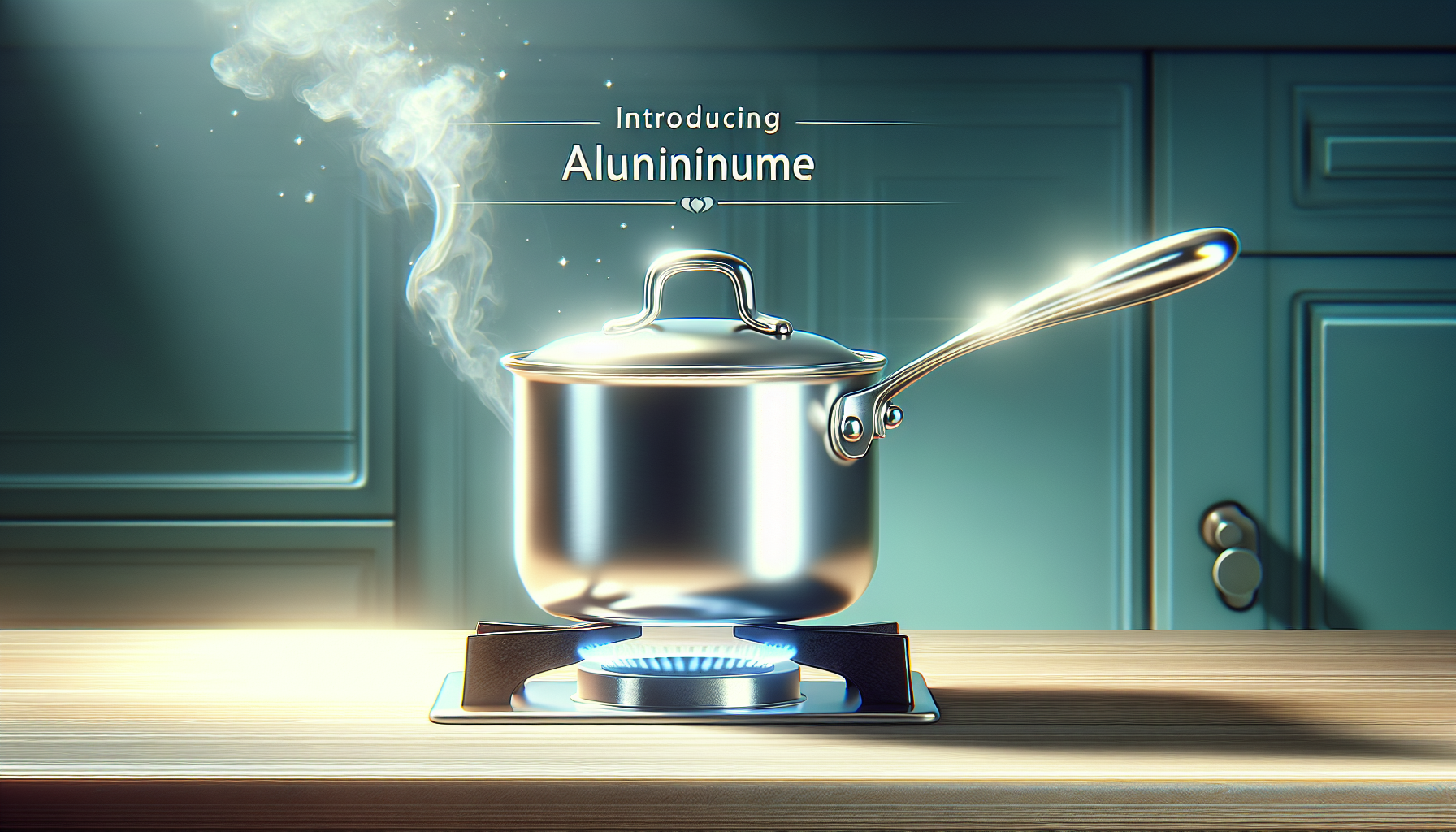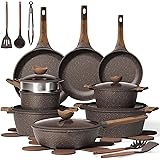In the world of cooking, aluminum cookware remains a popular choice for its affordability and excellent heat conductivity. However, there has been some debate surrounding its safety and potential health concerns. This article aims to shed light on the subject, exploring if there are truly any risks associated with using aluminum cookware and what you should consider when making decisions about your kitchen arsenal. So, let’s put on our chef hats and embark on a journey to discover the truth about aluminum cookware’s impact on our health.
Some suggestions to consider!
T-fal Stainless Steel Cookware Set, 11 Piece, Induction Cookware, Oven Safe to 500°F, Kitchen Cooking Set w/Fry Pans, Pots and Pans, Dutch Oven, Saucepans, Kitchen Essentials, Silver
$169.99 (as of January 27, 2026 05:34 GMT +00:00 - More infoProduct prices and availability are accurate as of the date/time indicated and are subject to change. Any price and availability information displayed on [relevant Amazon Site(s), as applicable] at the time of purchase will apply to the purchase of this product.)CAROTE 26PCS Pots and Pans Set Non Stick, Cookware Set Pots and Pans Induction Cook Ware, Nonstick Kitchen Cooking, PFOA Free
$219.99 (as of January 27, 2026 11:57 GMT +00:00 - More infoProduct prices and availability are accurate as of the date/time indicated and are subject to change. Any price and availability information displayed on [relevant Amazon Site(s), as applicable] at the time of purchase will apply to the purchase of this product.)Astercook 23 Pcs Pots and Pans Non Stick Ceramic Cookware Set Detachable Handle, RV Stackable Kitchen Cooking Set Removable Handles, Oven Safe, Induction Ready, Cream White
$119.99 (as of January 27, 2026 05:34 GMT +00:00 - More infoProduct prices and availability are accurate as of the date/time indicated and are subject to change. Any price and availability information displayed on [relevant Amazon Site(s), as applicable] at the time of purchase will apply to the purchase of this product.)

Potential Health Risks of Aluminum Cookware
Aluminum cookware has been a staple in kitchens for many years due to its affordability and excellent heat conductivity. However, there have been concerns about the potential health risks associated with using aluminum cookware. In this article, we will explore some of the potential health risks and factors affecting aluminum leaching, discuss regulatory standards for aluminum cookware, explore alternative options, provide tips for minimizing aluminum exposure, and review the findings of various research studies. It’s essential to make informed choices when it comes to our cookware to ensure the well-being of ourselves and our loved ones.
Aluminum Leaching into Food
One of the main concerns with aluminum cookware is the potential leaching of aluminum into the food during cooking. When we cook acidic or high-temperature foods in aluminum pots or pans, a small amount of aluminum can migrate into the food. This is problematic because excessive intake of aluminum is not considered safe for human consumption.
Aluminum and Alzheimer’s Disease
There has been a long-standing debate about the possible link between aluminum exposure and Alzheimer’s disease. Some studies suggest that elevated levels of aluminum in the brain may contribute to the development of this neurodegenerative disease. However, the scientific community has not reached a consensus on this matter, and more research is needed to establish a definitive connection.
Aluminum and Bone Health
Aluminum accumulation in the body can also have an impact on bone health. High levels of aluminum may interfere with calcium absorption and contribute to bone diseases such as osteoporosis. While studies have shown this association in individuals with impaired kidney function, the impact of aluminum on bone health in the general population is still under investigation.
Aluminum and Kidney Function
The kidneys play a vital role in filtering and excreting toxins from our bodies. Studies have suggested that prolonged exposure to high levels of aluminum may lead to kidney dysfunction and damage. Individuals with impaired kidney function are especially susceptible to the adverse effects of aluminum, as their bodies may have difficulty eliminating excess aluminum.
Aluminum and Neurological Disorders
Apart from Alzheimer’s disease, some research studies have explored the potential association between aluminum exposure and other neurological disorders. These include Parkinson’s disease, amyotrophic lateral sclerosis (ALS), and multiple sclerosis. However, the results have been inconclusive, and further research is necessary to establish any possible links.
Factors Affecting Aluminum Leaching
Several factors can influence the amount of aluminum that leaches into food during cooking with aluminum cookware. By understanding these factors, we can make informed decisions to minimize aluminum exposure.
Cooking Acidic Foods
Cooking acidic foods, such as tomatoes or citrus fruits, in aluminum cookware can result in higher amounts of aluminum leaching. Acidic substances react with the aluminum, causing it to be released into the food. To minimize this, consider using alternative cookware options when preparing acidic dishes.
Cooking High-Temperature Foods
When exposed to high temperatures, aluminum cookware can leach more significant amounts of aluminum into the food. This is particularly true when cooking at temperatures above 176°F (80°C). To reduce the risk, cooking high-temperature foods in stainless steel or cast iron cookware might be a better option.
Cooking with Damaged or Scratched Cookware
Damaged or scratched aluminum cookware poses a higher risk of aluminum leaching. These imperfections in the surface can facilitate the migration of aluminum into food. It is crucial to regularly inspect your cookware and replace any damaged pieces to minimize health risks.
Cooking for Prolonged Duration
Extended cooking times can also contribute to increased aluminum leaching. The longer the food stays in contact with the aluminum surface, the greater the chance of aluminum migration. Minimize cooking times wherever possible to reduce aluminum exposure.
Regulatory Standards for Aluminum Cookware
To ensure consumer safety, various regulatory agencies around the world have established standards and guidelines for aluminum cookware. Let’s explore some of the key regulatory standards.
FDA Regulations
In the United States, the Food and Drug Administration (FDA) regulates the safety of cookware materials, including aluminum. The FDA has deemed aluminum cookware safe for use, as long as it meets specific requirements and regulations. Manufacturers must adhere to these guidelines to ensure the safety of their products.
European Food Safety Authority (EFSA) Standards
In Europe, the European Food Safety Authority (EFSA) sets regulations for aluminum in cookware. EFSA has established strict migration limits, ensuring that the amount of aluminum released into food during cooking remains within safe levels. European consumers can feel confident knowing that aluminum cookware must meet these stringent standards.
Other International Regulatory Agencies
Various other countries and regions also have their own regulatory agencies that oversee the safety of aluminum cookware. These agencies set standards and conduct periodic testing to ensure compliance with safety regulations. It is advisable to check for regulatory certifications or approvals when purchasing aluminum cookware in different countries.
Aluminum Alternatives for Cookware
If you’re concerned about aluminum and prefer to minimize your exposure, several alternative cookware options are available. Let’s explore some popular alternatives to traditional aluminum cookware.
Stainless Steel Cookware
Stainless steel cookware is a popular choice for many home cooks due to its durability and non-reactive nature. Unlike aluminum, stainless steel does not leach metals into food, making it a safe and reliable alternative. Look for high-quality stainless steel cookware with an aluminum or copper core for even heat distribution.
Cast Iron Cookware
Cast iron cookware has been used for centuries and is renowned for its excellent heat retention properties. It is a safe and durable alternative to aluminum, as it does not release any harmful substances into the food. However, it requires regular seasoning and can be heavier to handle.
Copper Cookware
Copper cookware is prized in the culinary world for its exceptional heat conductivity and precise temperature control. When copper is properly lined with stainless steel or tin, the food does not come into direct contact with the copper. This eliminates any potential risks associated with copper leaching, providing a safe cooking surface.
Non-Stick Cookware with Aluminum Core
If you still prefer non-stick cookware but want to minimize aluminum exposure, consider choosing non-stick options that have an aluminum core encapsulated between layers of non-reactive materials. These cookware types offer the convenience of non-stick surfaces while minimizing direct contact between food and aluminum.

Tips for Minimizing Aluminum Exposure
While switching to alternative cookware options is one way to minimize aluminum exposure, there are also other practices to consider when using aluminum cookware. Here are some tips to help reduce your aluminum intake:
Pre-seasoning Aluminum Cookware
Pre-seasoning your aluminum cookware can create a protective layer that minimizes metal leaching. To season, wash the cookware thoroughly, then lightly coat the interior with cooking oil. Heat the cookware on low heat for approximately 15 minutes. Repeat this process periodically to maintain the seasoning.
Using Ceramic Coated Aluminum Cookware
Ceramic-coated aluminum cookware provides a non-reactive surface that prevents direct contact between food and aluminum. This helps minimize aluminum leaching while still enjoying the benefits of lightweight aluminum cookware.
Avoiding Aluminum Foil for Cooking
When cooking or baking, consider alternatives to aluminum foil, as it can transfer aluminum into food, especially when exposed to high temperatures or acidic ingredients. Opt for parchment paper or silicone baking mats instead.
Avoiding Aluminum Cookware in Acidic Recipes
As mentioned earlier, cooking acidic foods in aluminum cookware increases the risk of aluminum leaching. If possible, choose alternative cookware materials like stainless steel or ceramic for recipes that involve acidic ingredients.
Properly Maintaining and Cleaning Aluminum Cookware
Taking proper care of your aluminum cookware can help minimize the potential for aluminum leaching. Avoid using harsh scrubbers or abrasive cleaners that can damage the surface of the cookware. Handwashing with mild dish soap and a soft sponge is generally sufficient for cleaning aluminum cookware.
Research Studies on Aluminum Cookware
Numerous research studies have been conducted to assess the safety of aluminum cookware and its potential health risks. Let’s take a closer look at some key findings from these studies.
Studies Showing Significant Aluminum Leaching
Several studies have demonstrated significant aluminum leaching from aluminum cookware, especially when cooking acidic or high-temperature foods. These findings emphasize the importance of being cautious when using aluminum cookware and considering alternative options for specific cooking methods.
Studies Finding Limited Aluminum Leaching
On the other hand, some studies have reported minimal aluminum leaching from aluminum cookware, suggesting that the actual risk may be lower than initially perceived. However, it is essential to note that cooking methods, duration, and other factors can influence the results of these studies. More research is needed to establish a definitive conclusion.
Studies on Aluminum and Alzheimer’s Disease
The relationship between aluminum and Alzheimer’s disease has been extensively studied, but the findings remain inconclusive. While some studies have found a potential association between aluminum exposure and Alzheimer’s disease, others have reported conflicting results. More research is necessary to understand the complex mechanisms involved.
Studies on Aluminum and Bone Health
Studies investigating the link between aluminum and bone health have mainly focused on individuals with impaired kidney function. These studies have found that aluminum can negatively affect calcium absorption, potentially contributing to bone diseases such as osteoporosis. However, the impact of aluminum on bone health in the general population requires further investigation.
Studies on Aluminum and Kidney Function
Research has indicated that prolonged exposure to high levels of aluminum can lead to kidney dysfunction. Individuals with impaired kidney function are particularly vulnerable to the adverse effects of aluminum. These findings highlight the importance of monitoring aluminum intake, especially for those with kidney-related health concerns.

Expert Recommendations
Various prominent organizations have provided recommendations regarding the use of aluminum cookware based on the available scientific evidence. Let’s consider the viewpoints of some of these trusted sources.
American Medical Association (AMA)
The American Medical Association recognizes the theoretical health risks associated with aluminum exposure. They suggest minimizing aluminum intake through cookware choices and maintaining a balanced diet. However, they also acknowledge the need for additional research to establish a definitive link between aluminum and specific health conditions.
National Institute of Environmental Health Sciences (NIEHS)
The National Institute of Environmental Health Sciences recommends avoiding the use of aluminum cookware for individuals with impaired kidney function or those who are at an increased risk of aluminum toxicity. They also emphasize the importance of balanced nutrition and using alternative cookware options to reduce potential aluminum exposure.
World Health Organization (WHO)
The World Health Organization states that the primary source of aluminum exposure for the general population comes from food, water, and air. WHO maintains that the levels of aluminum typically found in food, including food cooked in aluminum cookware, are considered to be safe. They advise consumers to maintain a balanced diet and follow local regulations pertaining to aluminum in cookware.
American Cancer Society (ACS)
The American Cancer Society highlights that while aluminum is widespread in the environment, there is no consistent evidence linking aluminum exposure to increased cancer risk. They recommend following proper cooking and storage practices, such as avoiding highly acidic or salty foods in aluminum cookware, to minimize potential leaching.
Common Misconceptions about Aluminum Cookware
There are several misconceptions surrounding aluminum cookware that are important to address. Let’s explore a few of the common misunderstandings.
Aluminum as a Major Source of Aluminum Exposure
While it is true that cooking with aluminum cookware can contribute to aluminum exposure, the main sources of aluminum intake are usually food, water, and medications. The vast majority of individuals exposed to aluminum through cookware do not consume levels that pose significant health risks, especially when following recommended cooking practices.
Aluminum Pans as a Direct Cause of Alzheimer’s Disease
The idea that aluminum pans directly cause Alzheimer’s disease has been a topic of concern. However, the scientific community has not found convincing evidence to support this claim. Alzheimer’s disease is a complex condition with various contributing factors, and the connection between aluminum and the disease requires further research.
Ingested Aluminum Being the Primary Health Concern
While ingested aluminum can contribute to aluminum accumulation in the body, the primary concern usually lies with individuals who have impaired kidney function or prolonged exposure to high levels of aluminum. For the general population, following recommended cooking practices, maintaining a balanced diet, and minimizing exposure from other sources are typically sufficient.
All Aluminum Cookware Being Unsafe
It is essential to distinguish between different types of aluminum cookware. While some low-quality aluminum cookware may pose higher risks, high-quality aluminum cookware that adheres to regulatory standards is considered safe for normal cooking practices. Choosing reputable brands and products that meet established safety guidelines can help ensure the safety of your aluminum cookware.

Conclusion
Ultimately, while there have been concerns about potential health risks associated with using aluminum cookware, the scientific community has not reached a definitive consensus. The amount of aluminum that leaches into food during cooking is influenced by various factors such as the type of food, cooking temperature, and cookware condition. Regulatory agencies, such as the FDA and EFSA, have established standards and guidelines to ensure the safety of aluminum cookware.
If you prefer to minimize aluminum exposure, there are alternative cookware options available, such as stainless steel, cast iron, and copper cookware. Following particular cooking practices, like pre-seasoning aluminum cookware and avoiding cooking highly acidic foods, can help reduce aluminum intake.
Research studies have provided mixed findings regarding significant aluminum leaching and its potential health effects. Expert recommendations from organizations like the AMA, NIEHS, WHO, and ACS emphasize the importance of maintaining a balanced diet, using alternative cookware as needed, and following local regulations.
It’s crucial to address common misconceptions surrounding aluminum cookware and make informed choices based on available scientific evidence. By considering the potential health risks, understanding the factors affecting aluminum leaching, and adopting recommended practices, you can ensure the safe and responsible use of aluminum cookware in your kitchen.













